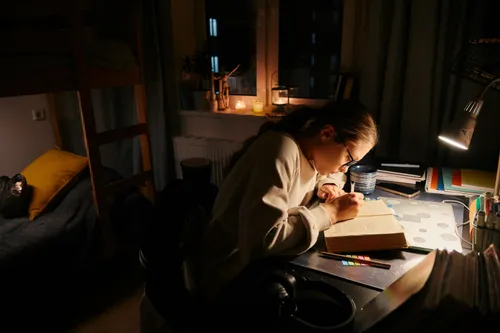
Self Care
|April 16, 2025
Digital Detox: Reclaiming Focus and Reducing Anxiety
Be honest — when was the last time you went more than an hour without checking your phone? If the thought of that makes you uncomfortable, you’re definitely not alone. Between uni emails, group chats, TikTok, Instagram, and the constant ping of notifications, being “always connected” has become the norm.
But here’s the catch — while your phone keeps you linked to friends, study groups, and the latest memes, it could also be quietly draining your focus and ramping up your anxiety.
If you’ve been feeling overwhelmed, distracted, or just mentally fried, it might be time for a digital detox — and no, that doesn’t mean disappearing into the woods without Wi-Fi. It’s about setting healthy boundaries with your tech so you can reclaim your attention, reduce stress, and feel more in control of your day.
Let’s talk about how to stay connected without feeling constantly consumed.
The Hidden Impact of Being “Always On”
We all know screens are a huge part of student life — lectures, research, socialising, entertainment — it’s all digital. But what most people don’t realise is how being glued to your phone or laptop 24/7 can mess with your head.
Every time your phone buzzes, your brain gets a little hit of dopamine — that’s the “feel-good” chemical. It’s the same thing that keeps you scrolling long after you planned to stop. But constantly switching your attention between apps, notifications, and tasks leaves your brain scattered. No wonder it feels impossible to focus on that essay for more than five minutes without checking your phone “just quickly.”
And it’s not just about distraction. Research from Student Minds and Student Space shows that high levels of screen time — especially social media — are linked to increased feelings of anxiety, comparison, FOMO, and low mood. Basically, the more time you spend mindlessly scrolling, the worse you tend to feel.
The good news? You don’t have to quit tech cold turkey. A digital detox isn’t about deleting every app and living off-grid — it’s about creating intentional screen time, where you decide when and how you engage, instead of being ruled by notifications.
Signs You Might Need a Digital Detox
Not sure if your screen habits are affecting you? Here are a few red flags:
- You feel anxious if you can’t check your phone.
- You pick up your phone without thinking — and suddenly 30 minutes have disappeared.
- You struggle to focus on uni work without reaching for a device.
- Social media leaves you feeling more drained than connected.
- You check your phone first thing in the morning and last thing at night.
If any of these sound familiar, it’s probably time to reset your relationship with your devices.
How to Start Your Own Digital Detox (Without Going Extreme)
You don’t need to vanish from the group chat or delete every app to feel better. Here’s how to take back control in a way that’s realistic for student life:
1. Set ‘No-Phone’ Zones and Times
Pick certain times or places where your phone is off-limits. This could be:
- During meals
- The first 30 minutes after you wake up
- An hour before bed
- While studying (more on that in a sec)
These small breaks give your brain breathing space and help reduce that twitchy, “must check phone” habit.
2. Use Focus Tools — Let Tech Work For You
Most phones now come with built-in focus modes or app timers. Use them! Set limits on apps that suck you in (looking at you, TikTok) or schedule ‘Do Not Disturb’ periods when you need to concentrate.
There are also great apps like Forest or Freedom that block distractions while you study — so you’re not relying on willpower alone.
3. Audit Your Notifications
You don’t need to be alerted every time someone likes a post or a random app decides to “re-engage” you. Go through your settings and turn off non-essential notifications. That way, when your phone buzzes, it’s actually something important.
4. Make Social Media Intentional
Instead of scrolling out of habit, decide when you’ll check social media — and stick to it. Maybe you give yourself 20 minutes in the evening to catch up, rather than dipping in and out all day.
Ask yourself: Is this helping me relax, or am I just avoiding something? If it’s the latter, it’s probably time to put the phone down.
5. Replace Screen Time With Something That Actually Recharges You
Here’s a secret: you’re not addicted to your phone — you’re probably just bored or stressed. Find other ways to unwind that don’t involve a screen, like:
- Going for a walk
- Reading (for fun, not coursework!)
- Listening to music or podcasts
- Catching up with a mate in person
- Trying out a hobby you’ve abandoned
The goal isn’t to “fill every minute” — it’s to give your brain a chance to reset properly.
The Benefits You’ll Notice (Pretty Quickly)
Once you start setting boundaries with your devices, you’ll probably notice:
- Better focus when you study (hello, shorter library sessions!)
- Reduced feelings of anxiety and overwhelm
- Improved sleep — especially if you cut screen time before bed
- More meaningful social interactions
- Actually feeling bored sometimes — which is when creativity kicks in
A digital detox isn’t about restriction — it’s about freedom. Freedom from the constant noise, the pressure to always be “on,” and the endless stream of content fighting for your attention.
Final Thoughts: Take Control Back
Your phone isn’t the enemy — but letting it run your day is. In a world designed to keep you scrolling, choosing to pause, disconnect, and be present is a powerful act of self-care.
Start small. One less scroll here, a phone-free hour there. You don’t need to be perfect — just more intentional.
And if you’re feeling overwhelmed by tech or social media, remember you’re not alone. Uni wellbeing services, as well as platforms like Student Space, offer support if you ever need to chat about managing stress and anxiety in a hyper-connected world.
So, how about starting your detox today? After you finish reading this, of course.
Related Articles

May 13, 2025
Creating an Integrated Routine: Balancing Study, Work, and Leisure
University life demands a lot, deadlines, part-time work, lectures, social commitments, house admin, and somewhere in the mix, sleep and self-care. Trying to juggle it all can feel like a constant struggle, especially when time never seems to be on your side.

May 4, 2025
Sleep, Screens, and Sanity: Crafting a Restful Night Routine
Let’s be honest, sleep is probably not top of your priority list right now, is it? Between lectures, deadlines, late-night chats, and the never-ending scroll on TikTok, it’s easy to let bedtime slide. After all, there’s always coffee in the morning, right?
News & Hot Takes
Get weekly updates
Interested in Mind Measure?
Fill in the adjacent form and we can send you a login so you can experience mind measure yourself.

